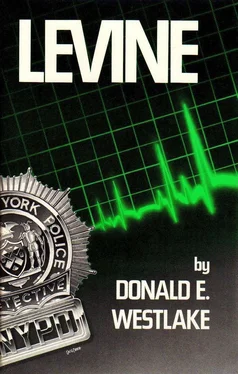Donald E. Westlake
Levine
“The Best-Friend Murder” © 1959 by HSD Publications Inc. First published in Alfred Hitchcock’s Mystery Magazine, December 1959.
“Come Back, Come Back” © 1960 by HSD Publications Inc. First published in Alfred Hitchcock’s Mystery, Magazine October 1960.
“The Feel of the Trigger” © 1961 by HSD Publications Inc. First published in Alfred Hitchcock’s Mystery Magazine, October 1961.
“The Sound of Murder” © 1962 by HSD Publications Inc. First published in Alfred Hitchcock’s Mystery Magazine, December 1962.
“The Death of a Bum” © 1965 by Donald E. Westlake. First published in Mike Shayne’s Mystery Magazine, June 1965.
“After I’m Gone” © 1984 by Donald E. Westlake.
In some ways, 1959 was for me a very good year. The preceding fall, I’d moved to New York and gotten a job as reader for a literary agent and settled myself down at last to the task of figuring out how to (a) become a writer and (b) make a living at it. In 1959, fired with youth and freshness and enthusiasm, I churned out more work than in any other year of my life, and most of it found a market. When the dust had settled, it turned out I had produced over half a million published words that year (we say nothing of the unpublished words) and had become a freelance writer. In April, with blind optimism, no money, and an extremely pregnant wife, I had quit my literary agency job, and since that date I have never once, I am happy to say, earned an honest dollar in wages.
Among that year’s output were forty-six short stories and novelettes, of which twenty-seven were published. (That’s about a third of all the short stories I’ve written over my entire life so far.) One of those pieces, written early in March, was novelette entitled “Intellectual Motivation” (I hadn’t yet completely cracked the problem of titles — still haven’t, come to think of it), which was published in the December 1959 issue of Alfred Hitchcock’s Mystery Magazine under the not-much-better-title, “The Best-Friend Murder.” The story contained clear analogies to my own current situation, and when I look back on it from a vantage point (if that’s the phrase I want) of twenty-four years I see it contains more than a little self-analysis and self-criticism. I wasn’t really aware of all that at the time, of course, or I would have been too self-conscious to write the story. (We do write what we know, whether we know it or not.) What attracted me then — and what I still think is the story’s major excuse for existence — was the attitude of the detective toward the idea of death.
In any mystery story, one element is inevitably the detective’s attitude toward death, his reaction to the concept of death. The amateur detectives, for instance, the whimsical Wimseys and quaint Queens, view death in the shallowest possible way, as a solvable puzzle, which is in any event one of the subliminal comforts of the mystery form. Death is stripped of its grief, horror, loss, irrevocability; we are not helpless, there is something we can do. We can solve death.
Similarly, it has become the convention that policemen, professional detectives, are hardened to death, immune to life untimely nipped. “All I want is the facts, ma’am,” Jack Webb used to say in his Sergeant Friday persona on Dragnet ; nothing would make him scream, or cry, or — o’ercome — turn aside his head. (Although they broke with that just once, when the actor who played Friday’s partner died. They wrote it in, and on camera Jack Webb — somehow no longer the cop — did cry, was human, faced death squarely.)
But is the policeman not flesh? Doth he not bleed? Hasn’t he in his own lifetime buried grandparents, parents? Isn’t he aware of his own mortality? It was the idea of a cop, a police detective, who was so tensely aware of his own inevitable death that he wound up hating people who took the idea of death frivolously that led me to Abe Levine and “The Best-Friend Murder” ( née “Intellectual Motivation”).
Which doesn’t mean I saw a series in it. The other twenty-six published 1959 stories produced no sequels, nor did I ever expect to see Detective Levine again once he’d finished his gavotte with Larry Perkins. But for some reason he stayed in my mind, a worrying painstaking fretful unheroic man, a fifty-three-year-old who seemed to me at the age of twenty-five to be almost a doddering ancient, but who from my present position I realize is in the absolute prime of life. Levine had not entirely explained himself in that first novelette, nor had his relationship with death been completely explored. From time to time I thought about him, and slowly another story idea took rough shape in my mind, but I didn’t get around to writing it.
Then a different story took shape instead, a further exploration of Abe Levine and the idea of death. What if he were faced with a potential suicide, someone who wanted to throw away that which Levine found most precious? Would Levine reject him, hate him, turn away from him? Or would he try, desperately, compulsively, to convert the suicide to Levine’s own point of view? And if the latter, what would it mean? It was in June of 1960, fifteen months after Levine’s birth, that I put him together with that man on the ledge, in a story I titled (sensibly enough, I thought) “Man on a Ledge,” but which Alfred Hitchcock’s Mystery Magazine published in October of 1960 as (and here I think they were wrong) “Come Back, Come Back.”
A sequel does not necessarily a series make. Having used Levine twice, it would have been possible then to go directly to that other story I’d thought of, work out the plot details, and have a true series on my hands — if a short one — but still I hesitated, and then six months later, in December of that year, with Christmas coming on, another permutation in the on-going story of Levine and death occurred to me, and I wrote “The Feel of the Trigger.”
There are several things to say about “The Feel of the Trigger.” First, at last Alfred Hitchcock’s Mystery Magazine , which published the story in October of 1961, agreed with me on a tide; it was published as “The Feel of the Trigger.” Second, this story probably shows at its peak the influence of Evan Hunter on my development as a writer. He had run down these same alleys just a few years before me, had worked for the same literary agency, published in the same or similar magazines. His 87th Precinct novels, as by Ed McBain, had started being published just around the time I was first seriously trying to figure out how to be a self-supporting writer. Naturally, I read them. They were that rarity, that near-impossibility, something new under the sun, and naturally I was impressed by and influenced by them. I would not for a moment blame Evan Hunter for “The Feel of the Trigger”; I would only say that a kind of specificity of description and a particular method of entering the protagonist’s mind did not exist in my stories before I read Evan Hunter.
Sometimes poetic justice is comic; maybe we should call it doggerel justice. At the time “The Feel of the Trigger” was published, an 87th Precinct series was on television; the only story of mine ever bought to be the basis of an episode in a television series was “The Feel of the Trigger.” It ran as an 87th Precinct story on February 26th, 1962, with Meyer Meyer the character who was worried about his heart condition. Unfortunately, I couldn’t be home that night, but a friend offered to tape the program for me. Remember, we’re talking about 1962, not 1982, and the tape he was talking about was sound . He did record the program, and some time later I heard it, and my memory of it is of a lot of footsteps and several doors being opened. Some day I’d like to see that show.
Читать дальше






